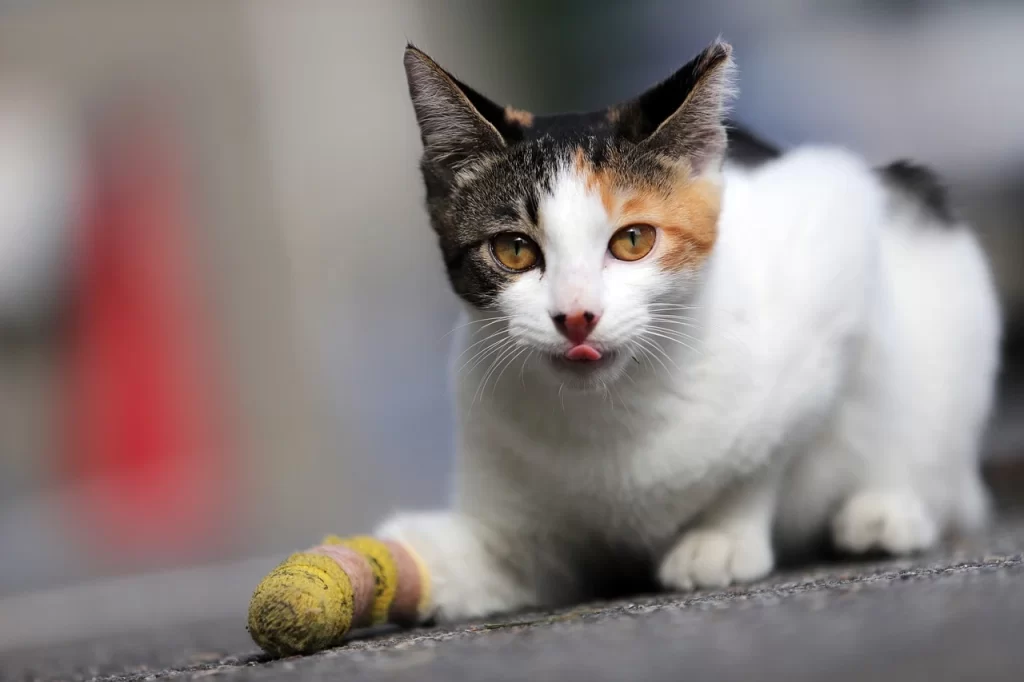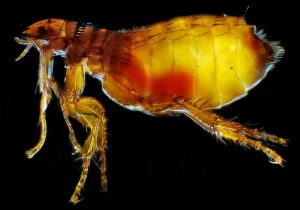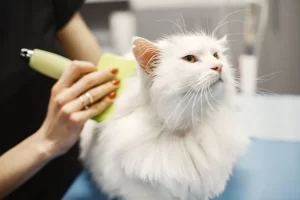Cancer is a serious and often devastating diagnosis for cats, and conventional treatments such as chemotherapy and radiation therapy can be both costly and have harsh side effects. As a result, many cat owners are turning to alternative treatments such as homeopathy to help manage their cat’s cancer. Homeopathic treatment for cats with cancer is a form of complementary therapy that uses highly diluted substances to stimulate the body’s natural healing mechanisms. In this article, we will explore the science behind homeopathy, the potential benefits and risks of homeopathic treatment for cats with cancer, and how to integrate homeopathy into a comprehensive cancer treatment plan for your furry companion.
Table of Contents
ToggleUnderstanding the Types of Cancers that Affect Cats
Cancer is a complex disease that can manifest in various parts of a cat’s body. Some of the most common types of cancer that affect cats include lymphoma, leukemia, mammary gland tumors, and squamous cell carcinoma. Each type of cancer has different symptoms, treatments, and prognosis. For example, lymphoma is a type of cancer that affects the lymphatic system, which is responsible for carrying fluids and immune cells throughout the body. The symptoms of lymphoma in cats may include swollen lymph nodes, weight loss, loss of appetite, vomiting, and diarrhea. Treatment options for lymphoma may include chemotherapy, radiation therapy, surgery, and homeopathy. Homeopathic remedies for lymphoma in cats may include Arsenicum album, Phosphorus, and Ruta graveolens.
Leukemia, on the other hand, is a cancer of the blood cells, which can affect the bone marrow, lymph nodes, and other organs. The symptoms of leukemia in cats may include anemia, lethargy, weakness, weight loss, and infections. Treatment options for leukemia may include chemotherapy, radiation therapy, bone marrow transplantation, and homeopathy. Homeopathic remedies for leukemia in cats may include Thuja occidentalis, Lycopodium, and Sulphur.
Homeopathic Remedies for Cats with Cancer
Homeopathic remedies for cats with cancer are based on the principle of “like cures like.” This means that a substance that causes symptoms in a healthy cat can cure similar symptoms in a cat with cancer. Homeopathic remedies for cats with cancer may include single remedies or complex formulas. Single remedies are made from one substance, while complex formulas are made from a combination of several substances. Some of the most commonly used homeopathic remedies for cats with cancer include Calcarea carbonica, Carcinosinum, Conium maculatum, and Phytolacca decandra.
Calcarea carbonica is a homeopathic remedy that is often used for cats with cancer that have a slow-growing tumor. The symptoms may include a loss of appetite, lethargy, and weight loss. Carcinosinum is a homeopathic remedy that is often used for cats with cancer that have a family history of cancer. The symptoms may include a loss of appetite, fatigue, and weakness. Conium maculatum is a homeopathic remedy that is often used for cats with cancer that have a firm and enlarged tumor. The symptoms may include a lack of energy, difficulty urinating, and constipation. Phytolacca decandra is a homeopathic remedy that is often used for cats with cancer that have a hard and painful tumor. The symptoms may include inflammation, fever, and sensitivity to touch.
The Science Behind Homeopathy and How It is Believed to Work in Treating Cancer
Homeopathy is based on the principle of “like cures like,” which means that a substance that causes symptoms in a healthy person can cure similar symptoms in a sick person or animal. Homeopathic remedies are made from natural substances, such as plants, minerals, and animals, which are diluted and succussed (shaken vigorously) to produce a potentized remedy. According to homeopathy, the dilution and succussion process releases the healing properties of the substance while removing any toxic effects.
Homeopathy is believed to work in treating cancer by stimulating the body’s natural healing abilities and strengthening the immune system. Homeopathic remedies for cats with cancer are selected based on the cat’s individual symptoms and constitution. The goal of homeopathy is not only to treat the cancer itself but also to improve the cat’s overall health and well-being.
While homeopathy is not a substitute for conventional cancer treatment, it can be used as a complementary therapy to help manage symptoms, improve quality of life, and reduce side effects of conventional treatments such as chemotherapy and radiation therapy. However, it’s important to consult with a veterinarian trained in homeopathy before using any homeopathic remedies for cats with cancer.
The Benefits of Homeopathic Treatment for Cats with Cancer
Homeopathic treatment for cats with cancer has several benefits, including:
- Non-Toxic: Homeopathic remedies are made from natural substances and are generally considered safe and non-toxic. Unlike conventional cancer treatments, such as chemotherapy and radiation therapy, which can have significant side effects, homeopathy is believed to have few, if any, side effects.
- Personalized Treatment: Homeopathic remedies are selected based on the cat’s individual symptoms and constitution. This means that each cat receives a personalized treatment plan that is tailored to their unique needs.
- Holistic Approach: Homeopathy is considered a holistic approach to healing, which means that it aims to treat the whole individual, including their mental, emotional, and physical aspects. This can be especially beneficial for cats with cancer, as the disease can have a significant impact on their overall well-being.
- Complementary Therapy: Homeopathy can be used as a complementary therapy to conventional cancer treatments, such as chemotherapy and radiation therapy. Homeopathy can help manage symptoms, improve quality of life, and reduce side effects of conventional treatments.
- Affordable: Homeopathic remedies are generally less expensive than conventional cancer treatments, making them a more affordable option for pet owners.
The Risks and Limitations of Homeopathic Treatment for Cats with Cancer
While homeopathy can be a safe and effective complementary therapy for cats with cancer, there are also risks and limitations that need to be considered. These include:
- Lack of Scientific Evidence: While there are anecdotal reports of homeopathy being effective in treating cancer in cats, there is a lack of scientific evidence to support its use. The limited scientific evidence available suggests that homeopathy may be useful in managing symptoms and improving quality of life, but its effectiveness in treating cancer itself is still unclear.
- Delayed Treatment: Choosing homeopathy as the sole treatment for cats with cancer can delay the start of conventional cancer treatments, which can have serious consequences for the cat’s health and prognosis. It’s important to work with a veterinarian who can provide a comprehensive treatment plan that includes both conventional and complementary therapies.
- Limited Treatment Options: Homeopathy may not be effective for all types of cancer, and there may be limited treatment options available for cats with advanced or aggressive cancers. In some cases, conventional cancer treatments may be necessary to manage the disease.
- Difficulty in Finding a Qualified Practitioner: Homeopathy is a specialized field, and it can be difficult to find a qualified veterinarian trained in homeopathy. It’s important to work with a veterinarian who has experience and training in both conventional and complementary therapies.
- Interference with Conventional Treatments: Some homeopathic remedies may interfere with conventional cancer treatments, such as chemotherapy and radiation therapy. It’s important to consult with a veterinarian trained in both homeopathy and conventional cancer treatments before using any homeopathic remedies for cats with cancer.
Popular Homeopathic Remedies for Cats with Cancer
Homeopathic remedies for cats with cancer are selected based on the cat’s individual symptoms and constitution. Here are some popular remedies that may be used in the treatment of cancer in cats:
- Carcinosinum: This remedy is made from the carcinosinum of a breast cancer patient and is often used in the treatment of breast cancer in cats.
- Thuja Occidentalis: This remedy is made from the leaves and twigs of the white cedar tree and is often used in the treatment of various types of cancer in cats, including bladder cancer and lymphoma.
- Arsenicum Album: This remedy is made from arsenic and is often used in the treatment of gastrointestinal cancers in cats.
- Phosphorus: This remedy is made from the mineral phosphorus and is often used in the treatment of bone cancer in cats.
- Lycopodium: This remedy is made from the spores of the clubmoss plant and is often used in the treatment of liver cancer in cats.
It’s important to note that these remedies should only be used under the guidance of a qualified veterinarian trained in homeopathy. The appropriate remedy and dosage will depend on the individual cat’s symptoms and constitution.
Integrating Homeopathy into a Comprehensive Cancer Treatment Plan for Cats
Homeopathy can be a valuable addition to a comprehensive cancer treatment plan for cats. When used in conjunction with conventional cancer treatments, homeopathy can help manage symptoms, improve quality of life, and reduce side effects. Here are some tips for integrating homeopathy into a comprehensive cancer treatment plan for cats:
- Work with a Qualified Veterinarian: It’s important to work with a veterinarian who is trained in both conventional and complementary therapies, including homeopathy. Your veterinarian can help develop a treatment plan that is tailored to your cat’s individual needs.
- Use Homeopathy as a Complementary Therapy: Homeopathy should be used as a complementary therapy to conventional cancer treatments, not as a substitute. It’s important to follow your veterinarian’s recommendations for both conventional and complementary therapies.
- Monitor Your Cat’s Progress: Regular monitoring of your cat’s symptoms and overall health is important when using homeopathy as a complementary therapy for cancer. This can help your veterinarian adjust the treatment plan as needed to ensure that your cat is getting the best possible care.
- Consider the Costs: Homeopathy can be expensive, and it’s important to consider the costs of treatment when developing a comprehensive cancer treatment plan for your cat. Talk to your veterinarian about the costs of homeopathic remedies and any other complementary therapies that may be recommended.
- Be Patient: Homeopathy works slowly, and it may take some time to see results. It’s important to be patient and allow the treatment to work before making any changes to the treatment plan.
- Consider Other Complementary Therapies: In addition to homeopathy, there are other complementary therapies that may be useful in the treatment of cancer in cats. These may include acupuncture, massage therapy, and herbal medicine. Talk to your veterinarian about all the options available and which ones may be most appropriate for your cat.
The Role of Diet in Homeopathic Treatment for Cats with Cancer
Diet can play an important role in homeopathic treatment for cats with cancer. A healthy and balanced diet can help support the immune system and improve overall health, which can in turn support the effectiveness of homeopathic remedies. Here are some dietary considerations for cats with cancer:
- Feed a High-Quality Diet: A high-quality, balanced diet that is rich in protein and nutrients is essential for cats with cancer. Talk to your veterinarian about the best diet for your cat’s individual needs.
- Consider Supplementation: Supplements, such as omega-3 fatty acids and antioxidants, may be beneficial for cats with cancer. However, it’s important to talk to your veterinarian before giving your cat any supplements, as some may interfere with conventional cancer treatments.
- Avoid Feeding Raw or Undercooked Foods: Raw or undercooked foods can increase the risk of foodborne illness, which can be particularly dangerous for cats with weakened immune systems due to cancer or cancer treatments.
- Provide Plenty of Water: Cats with cancer may be more prone to dehydration, so it’s important to provide plenty of fresh water. If your cat is not drinking enough water, talk to your veterinarian about other options, such as adding water to your cat’s food or offering a water fountain.
- Consider a Specialized Cancer Diet: There are specialized diets available that are designed specifically for cats with cancer. These diets are often formulated with ingredients that are high in protein and nutrients and may also include supplements that are beneficial for cats with cancer.
In conclusion, integrating homeopathy into a comprehensive cancer treatment plan for cats requires a team approach and careful consideration of all aspects of your cat’s care. Homeopathy should always be used as a complementary therapy to conventional cancer treatments, not as a substitute. Working closely with a qualified veterinarian and monitoring your cat’s progress is essential to ensure that your cat is receiving the best possible care.
It’s also important to consider the costs associated with homeopathy and other complementary therapies, as well as the potential risks and limitations. While homeopathy can be a valuable addition to a comprehensive cancer treatment plan for cats, it’s important to be patient and allow the treatment to work before making any changes to the treatment plan.
Diet can also play an important role in homeopathic treatment for cats with cancer. Providing a high-quality, balanced diet and considering supplementation and specialized cancer diets can help support the immune system and improve overall health.
By taking a holistic approach to your cat’s care, including conventional cancer treatments, complementary therapies such as homeopathy, and dietary considerations, you can help support your cat’s health and well-being throughout the cancer treatment process.














